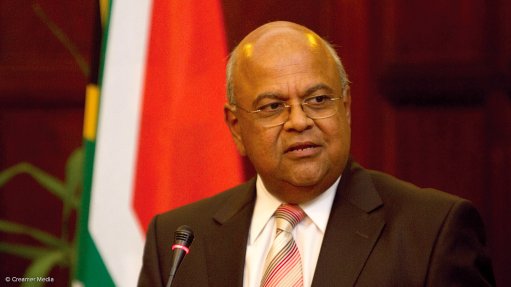
Photo by: Pravin Gordhan
As a delegation of South African Cabinet Ministers and business representatives prepares for the World Economic Forum’s (WEF’s) yearly meeting, to be held next week in Davos-Klosters, Switzerland, Finance Minister Pravin Gordhan has dismissed concerns that domestic political and policy uncertainty could herald subdued future foreign direct investment, asserting that the country still presents an attractive investment proposition.
“Yes, we have had ups and downs, but we are a stable country and it doesn’t mean our ship is about to sink. We’ve met some turbulence, some things have happened, we’ve taken that in our stride and moved on,” he told journalists following a meeting between government and business on Thursday.
Gordhan further warned the media to be careful of “strong, powerful and talkative lobbies” that attract attention to “issues in their interest”.
The delegation, led by President Jacob Zuma, would be guided in its discussions by the theme ‘Mastering the Fourth Industrial Revolution’, under which global leaders from across business, government, international organisations, academia and civil society would engage on various issues.
While acknowledging a “terrible” global economic climate, Gordhan said underperformance by some developing States had resulted in an unfairly negative view of emerging markets as a whole.
“The message we will be taking to Davos is one that says South Africa is a resilient country, with many plusses, such as business infrastructure, a strong monetary and fiscal policy, advanced infrastructure and a sophisticated business sector.”
Gordhan believed that South Africa remained an attractive destination for countries wanting to establish manufacturing plants or expand their existing plants, “as it is the most sophisticated industrial manufacturing base on the continent”.
“We need to focus on what we can do to build on this, energise it and expand it, as well as assist other parts of Africa to build up their manufacturing industries and increase regional integration,” he remarked.
Brand South Africa CEO Kingsley Makhubela added that the South African delegation wold carry the message that the country remained a good place to do business.
“Davos is all about selling South Africa. . . and allowing an interaction between the private sector and the governmental sector. You can see that in the South African delegation, with the large number of big corporates.
“We’re going to Davos with a solid message and we will talk about what we need to do, not what our problems are,” said Makhubela. He told the media that the delegation would address South Africa’s problems after Davos, adding that the WEF was not the right platform to discuss problems; rather, it served to market and sell what was good about a country.
Discussions at the WEF would be pursued under six broad agendas: the global agenda, the geosecurity agenda, the economic agenda, the regional and national agenda, the industry and business agenda, and the future agenda.
The global agenda would look to improve global governance through public–private cooperation by working in close collaboration with key international organisations and providing input into major multilateral processes.
The geosecurity agenda would seek to convene public- and private-sector leaders, as well as defence and intelligence experts in preparation for a rapidly changing security landscape.
The economic agenda looked to support multistakeholder efforts to deliver sustainable and inclusive economic growth in the face of slowing growth rates, increasing market volatility and looming global risks.
The WEF’s regional and national agenda would be driven by the need to examine the social and economic transformations occurring in all regions of the world through informal interaction with over 250 political leaders on trade- and investment-related issues in various national and regional contexts.
The industry and business agenda looked to shape the evolution of industry ecosystems and business models, particularly in the context of scientific, technological and policy innovations, by engaging industry leaders with their peers from government.
Discussion held under the future agenda would aim to share ideas, innovations and discoveries that would reshape the world by engaging those at the vanguard of change from fields such as the arts, media, medicine, science and technology, as well as the next generation of future leaders.